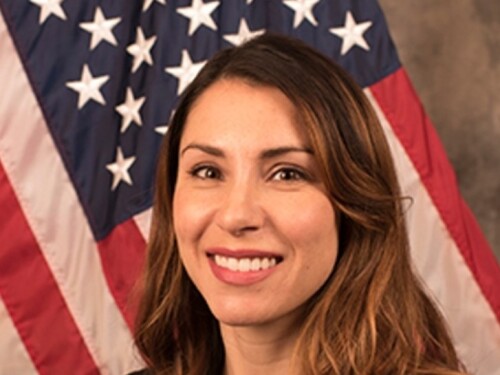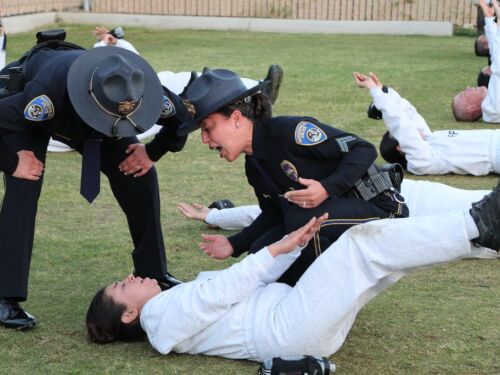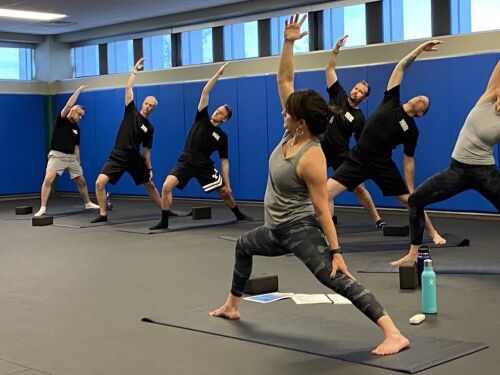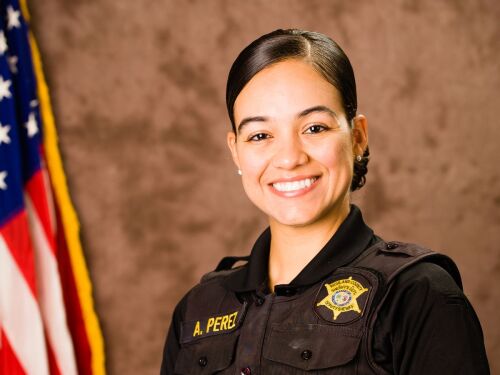With 18 years of service, Newport News (Va.) Police Department Captain Alison Funaiock has taken on various challenging roles, demonstrating resilience, commitment and a passion for law enforcement.
From her early days growing up in Newport News to her journey through patrol, SWAT and community outreach, Funaiock shares her experiences, insights and the significant health challenges she overcame to become a leader in her field.
Funaiock’s law enforcement journey began at Virginia Tech, where she studied psychology. She later pursued graduate studies in criminal justice at Virginia Commonwealth University, participating in the Public Safety Institute program. This experience solidified her interest in local law enforcement, leading her to join the Newport News Police Department in 2006.
Throughout her career, Funaiock has taken on various roles, including seven years in patrol, serving in the Honor Guard and becoming a member of the SWAT team. Her three-year stint as a SWAT sniper taught her to remain calm and think through all possible outcomes in high-stress situations, preparing her for future leadership roles.
Currently, Funaiock oversees Community and Youth Outreach, managing school resource officers and coordinating numerous outreach efforts, including 39 programs aimed at building strong, trusting relationships between the police and the community. Her dedication to proactive engagement is evident in her work with the Young Adult Police Commissioners program, where high school students learn about the police department and share their experiences and concerns.
Despite significant health challenges, including juvenile rheumatoid arthritis and Crohn’s disease, Funaiock has never let these obstacles hinder her career. Her perseverance and determination inspire many, demonstrating that physical limitations do not define one’s ability to lead and inspire.
Join us as we explore Captain Alison Funaiock’s story, her advice for aspiring female officers and her vision for the future of policing.
Can you tell me a little bit about yourself and your journey into law enforcement?
I work for the Newport News Police Department and have been here for 18 years. I was born and raised in Newport News and still live in the city. I attended college at Virginia Tech, and around high school, I knew I wanted to go into law enforcement. I can’t exactly explain what drew me to this field, but I found it interesting.
At Virginia Tech, they didn’t have a criminal justice program, so I studied psychology. Later, I attended VCU for graduate school and studied criminal justice. While there, I participated in the Public Safety Institute, a six-week program for public safety professionals from police and fire departments. The program ran Monday through Friday, 8 to 5, and although it was geared toward professionals, they allowed five graduate students to attend.
During the program, I mentioned my interest in local law enforcement. The captain of training and recruiting for Newport News Police was in the class with me and ended up recruiting me. After the class ended, I applied to the Newport News Police Department, and a few months later, in 2006, I joined the recruit class.
Since joining, I spent about seven years in patrol and took on secondary duties, which are additional responsibilities beyond the primary function. I joined the SWAT team, called the Tactical Operations Unit, starting as a perimeter member and then becoming a sniper for three years. I also served in the Honor Guard.
I progressed through the ranks, becoming a sergeant in my eighth year. I had various assignments, including recruiting, internal support, property and evidence management, and overseeing the records division. I also served as a district lieutenant, managing one or two city beats, and returned to the SWAT team as the deputy commander before becoming the commander for two years.
Additionally, I was a squad leader on the crowd management unit, our civil disturbance unit. Currently, I am a captain, overseeing community and youth outreach. I manage our school resource officers and coordinate numerous outreach efforts, including 39 different programs. I also oversee our ECO or TD officers, who are assigned to hospitals to assist individuals experiencing mental health crises.
Out of all those positions, which one has been your favorite?
I will say that one of the positions I haven’t held is that of a detective, primarily because I really enjoy street work. I loved being a patrol officer and a patrol sergeant. I spent the majority of my career on the evening shift, whether in patrol or as a patrol sergeant. I also really enjoyed the recruiting aspect, having done two stints in recruiting — one as a sergeant and another as a lieutenant.
It’s been an interesting time for law enforcement over the past few years, with significant civil unrest and the impact of COVID-19. These events have drastically changed recruiting, making it a very dynamic field. Some of the techniques we used in the past have evolved, and while I haven’t been in recruiting for a couple of years, I know our team does a great job. Recruiting is definitely something that continually evolves.
You faced some significant health challenges during your childhood. Can you talk a little about that and how it shaped who you are today as a law enforcement leader?
When I was two years old, I was diagnosed with juvenile rheumatoid arthritis. Most people think arthritis is something that only older people get, but kids can get it too. I faced a lot of challenges, especially because this was back in the 1980s and there were no pediatric rheumatologists in the Hampton Roads area at the time. It was really hard to find doctors who could diagnose me correctly.
With any disease or injury, you start with the lowest level of treatment and keep moving up if it doesn’t work. Over time, they had to keep increasing my medication and figuring out what worked. The arthritis was attacking my knees, elbows, wrists and ankles. The doctors even told my parents that I might end up in a wheelchair. I would wake up in the morning unable to walk until my joints loosened up, so I had to do physical therapy every day.
Luckily, I was still a pretty active kid. Kids are much more resilient than you think. Even though physical therapy was very painful, I just wanted to get it done so I could go play. My parents eventually took me to the Children’s Hospital in Washington, D.C., where we finally found a pediatric rheumatologist. We got my medication sorted out, and I went through phases of remission and flares. But I never let it hold me back. I started playing baseball when I was five and switched to fast pitch softball in high school. Despite the limitations and pain, I did what I wanted to do.
Ironically, rheumatoid arthritis is an autoimmune disease, and when I was around 26, I was also diagnosed with Crohn’s disease, another autoimmune disease. So, I battle two autoimmune diseases every day and take medication for them. I’ve learned that I need to stay healthy, and working out regularly helps control my stress levels. Despite these limitations, I was able to join the SWAT team after a rigorous physical tryout process. I never let it become an excuse for not doing something.
Growing up with rheumatoid arthritis taught me perseverance. When it comes to law enforcement, you need to go through a physical agility test and do physical activities every day at the academy. But you can do it. We have really good instructors who will teach you everything you need to know. There’s nothing to be scared about. Just pay attention, give it 100% and you’ll be fine.
Can you describe a typical day in your role as a captain at Newport News PD?
We have several captains at Newport News PD, each with different responsibilities. I oversee Community and Youth Outreach, but there are also captains in charge of precincts, investigations and special operations. Depending on my assignment, my daily activities can vary.
As a precinct captain, my day involves managing patrol operations, addressing crime trends, allocating resources and ensuring the mental wellbeing of officers, especially during overtime. I also connect with the community, addressing concerns from neighborhood watch groups and getting their feedback on local issues.
Currently, in my role overseeing schools and outreach efforts, my day can involve responding to threats, like recent threatening emails sent to schools. This requires coordinating with the public school system and other jurisdictions to ensure student safety.
On the outreach side, we focus a lot on youth programs. For instance, we have the Young Adult Police Commissioners (YAPC) program, where high school students from all six local high schools meet with us weekly. They learn about the police department, and we learn about their experiences and concerns. Recently, we took the YAPC students on our Marine Patrol boat, which was very well-received.
In essence, my day can start with addressing a law enforcement issue and end with community engagement through one of our many outreach programs.
What kind of feedback have you received from those involved in the YAPC program? Have any participants been inspired or motivated by you?
I don’t always mention that I was a sniper and the commander of the SWAT team. I can tell you that when people hear that I was a sniper or the commander of a SWAT team, their typical reaction is shock.
It really shouldn’t be shocking; I’m just someone who has held those positions. There have been snipers and SWAT commanders before — I just happen to be female. It is important, though, because it breaks stereotypes and opens doors for others.
For instance, a student in the YAPC program mentioned she wants to be a sniper in the military when she gets older. It helps her to see that I have done something similar, even if it was in law enforcement rather than the military.
We’ve also held Women’s Leadership Summits for our female officers and we’re going into our fourth year. The feedback we’ve received shows that it helps to see a female who has been a sniper and a SWAT team commander. It normalizes these roles for women, showing that they are achievable goals. I definitely think it makes a difference.
And it’s not just about me; I just happen to be the only female captain right now. There are four female lieutenants in our department, and we are all friends and a united team. We regularly talk and meet to discuss how we can inspire our younger female officers to achieve what we have.
The biggest thing for us is that we all support each other. I would love nothing more than to have another female captain with me. Even if one of the current female lieutenants were to promote to captain and later become an assistant chief, and I ended up working for her, we would all be cheerleaders for each other. We have talked about this, and whoever gets promoted, we all work with and support each other.
We stress this to our younger officers: we support each other and we hope they support us in our endeavors as well.
Historically, there has been animosity because there was a sense of competition, thinking only one of us could get promoted. We are striving to remove that mindset and foster a team mentality. Whoever ends up getting promoted, we are excited about it. I would love to see more female officers get promoted, and even if I ended up working for one or a few of them in the future, it would be a win for all of us.
What advice or recommendations would you give to women in law enforcement who are considering seeking promotion? Are there particular skills, characteristics or professional qualities that can help them stand out?
First, if you want to seek promotion, you have to apply for it. Many of our female officers feel they need to accomplish certain things before they’re ready, but it’s important to broaden your horizons. For example, I spent seven years in patrol and loved every minute of it. However, I realized I needed different experiences, so I moved to another precinct. It was still patrol but in a different part of the city, which provided new insights.
I recommend trying new things and applying for different positions, whether it’s detective work, recruiting, or secondary assignments like the crowd management unit or SWAT team. Gaining experience in various areas is crucial because, as you advance, you’ll need a mix of administrative and tactical skills.
When I became a sergeant, I was comfortable in patrol, but then I was moved to recruiting — a completely new area for me. I ended up loving it because it was different and I learned so much. Even if you think you won’t enjoy a particular assignment, you might be surprised. Right now, I’m in Community and Youth Outreach, which was another new experience for me. I was never a school resource officer or a supervisor in this unit, but I’ve been here for about 14 months now and I love it. It’s a completely different experience.
Don’t be afraid to broaden your horizons. Apply for different jobs and assignments within law enforcement. Even if you don’t get the promotion the first time, you’re always learning with every attempt. I didn’t make the SWAT team, sergeant, lieutenant or captain on my first try. I had to apply repeatedly and each time I learned something new.
You can always self-reflect and seek feedback from others. When I didn’t make captain the first time, I requested a meeting with our chief and asked him what I needed to work on and what else I could do. He gave me valuable feedback. Don’t be afraid to ask people with the knowledge and experience for advice. If you want to reach a certain position, ask what you can do now to prepare yourself for it in the future.
It can be scary to move into something new that you’re unsure about. But don’t be afraid to ask questions. Many people in those roles probably know more about them than you do. If you’re new, don’t hesitate to admit you might need help and seek out their knowledge — they will be willing to help you.
Persevere and push through; you’ll learn just like everyone else. I’ve been in my current role for 14 months, and while I’m still learning, I’m pretty comfortable within the unit now.
What interested you about SWAT?
When I went to the academy, I turned out to be a pretty good shooter, even though I had only shot a handgun a couple of times before. The instructors noticed my technique and thought I was a natural shooter. They told me that once I got off probation, I should try out for SWAT. This feedback got me thinking about it seriously.
When I got off probation, I put in for the SWAT team. The tryout was physically demanding and rigorous, involving shooting drills, running, dummy drags and low crawls. I didn’t make it the first time, but I knew what to expect and what I needed to work on. I spent more time in the gym and tried out again about six months later, making it the second time.
During training, I did a lot of shooting, and when a sniper position opened up, I tried out and got the spot. Being a sniper is interesting because it’s a lot of waiting and observing, which might not suit someone who likes to constantly be moving. However, it suited my personality well and it worked out great for me. That’s how it all happened.
Do you think your experience in SWAT prepared you for your leadership roles in the department?
Yes, SWAT can be very high-stress. We definitely had some scenes where I genuinely thought that at any point, someone — whether it was us or one of the people involved — could lose their life. These high-stress situations taught me to slow everything down and carefully consider all the different options and potential outcomes. It’s essential to have multiple plans (A, B, C and D) lined up and to be prepared to adapt if circumstances change.
In the highest stress scenarios, it teaches you to stay calm and think everything through. Now, in various situations in law enforcement, I remain calm and take a moment to think things through, develop a plan and proceed. Of course, there are times, like in an active shooter situation, where immediate action is required. However, overall, my SWAT experience taught me to slow down, consider different options and always have a contingency plan.
How is your department ensuring that female officers are not only supported in their decision to join law enforcement but also encouraged to stay and promote in the future?
Our committee has recognized that childcare is one of the biggest hurdles we face. For women who want to promote, having children is a significant consideration. When you get promoted to sergeant, you’re likely going back to a patrol spot, which can include a midnight shift. Some may not want to take on the midnight shift because of their children. This issue isn’t just for women — it affects everyone, men and women alike, who consider their kids when going for promotions.
One of the hurdles we are attempting to tackle with our Women’s Professional Development Committee is the childcare problem. If we could get a childcare option for our agency, that would be huge for us.
We know that some places in California have it up and running, so we’ve been looking into those models.
Looking forward, what goals do you have for the future?
This is now my second assignment as a captain, and as I mentioned before, it’s important to try new things. There are various positions for captains in the department, such as in investigations, special operations, and patrol or precincts. I wouldn’t mind exploring another position. There’s also the potential for an assistant chief role in the future, although there are no openings at the moment. For now, I aim to broaden my knowledge base as a captain and be prepared to pursue an assistant chief position when it becomes available.
Additionally, we are focusing on building female leadership within our department. We recently started a Women’s Professional Development Committee, which includes both men and women. This committee generates ideas and reflects on the future direction of our agency. One of the initiatives I’m excited about is the Women’s Leadership Summit we will be hosting later this year. These efforts are what I’m looking forward to and working on for the future.
NEXT: NAWLEE Executive Director Kym Craven shares why female police leaders should attend the National Association of Women Law Enforcement Executives conference:

















